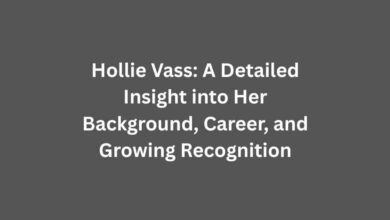Cassie Werber: A Fearless Voice in Modern Journalism and Storytelling

Cassie Werber is one of the most distinctive journalistic voices of the modern era, known for her nuanced exploration of work, climate, and society. A writer, journalist, and author based in London, she has built a reputation for combining intellect, empathy, and creative insight in everything she writes. From her earlier days as a performer and playwright to her current work as a journalist for some of the world’s most respected publications, Cassie Werber’s career is a fascinating journey through ideas, industries, and human stories. Her ability to blend facts with feeling, and her courage to write about complex social issues, make her one of the most compelling figures in contemporary British journalism.
Early Life and Education
Cassie Werber’s educational path reflects both depth and diversity. She studied English at Clare College, Cambridge, where she developed an early love for literature and storytelling. Her curiosity for human expression led her further to earn a master’s degree in performance from the Royal Central School of Speech and Drama, London. This unique background in the arts gave her writing a rare rhythm — a blend of analytical sharpness and emotional authenticity. Later, she pursued a Master’s in Journalism and Globalisation at City University London and Aarhus University in Denmark, specialising in global issues and media ethics. This combination of literature, performance, and global journalism shaped the foundation of her narrative voice — intelligent, precise, and human.
Transition from Theatre to Journalism
Before entering the world of journalism, Cassie Werber wrote for the stage and radio. Her early works, including Double Negative and And All Night Long, showed her talent for dialogue and her understanding of human psychology. These plays displayed her instinct for timing, tone, and realism — skills that later enriched her journalism. Her transition to reporting was not accidental; it was a natural progression from storytelling to truth-telling. What changed was not her passion, but her medium. She moved from fictional performance to factual storytelling, determined to bring clarity to real-world issues.
Career at the Wall Street Journal and Quartz
Cassie Werber’s professional career as a journalist began at the Wall Street Journal, where she covered energy, oil markets, and environmental policy. Working in London, she became known for her precise and data-driven reporting. Unlike many business journalists who focused purely on market movement, Werber’s writing captured the human dimension behind economic shifts. She understood that energy, climate, and commerce are not just numbers — they are stories about people, power, and responsibility.
Her next major chapter came with Quartz, a global digital business publication known for its fresh and analytical approach to news. At Quartz, Cassie Werber covered topics like workplace trends, sustainability, and innovation. Her articles on the evolving dynamics of office culture, gender equality, and the future of work attracted wide readership. She wrote about hybrid working, burnout, and the challenges modern workers face in balancing ambition with mental health. Through her work, she championed the idea that journalism should not just report facts but inspire empathy and understanding.
Writing Style and Philosophy
Cassie Werber’s writing style is both journalistic and literary. Her articles are built on strong research, yet they carry the warmth of a storyteller who understands human emotion. She avoids sensationalism and instead focuses on clarity and nuance. Her prose is balanced — simple but never shallow, direct but deeply thoughtful.
A defining quality of her work is curiosity. Werber approaches every subject, whether energy policy or workplace ethics, with an open mind. She questions trends, investigates patterns, and gives voice to those often left out of mainstream conversations. Her commitment to intellectual honesty and compassion has made her stand out among modern journalists who often face pressure to write for clicks rather than truth.
Cassie Werber as an Author
In April 2024, Cassie Werber published her debut novel, Open Season, with Trapeze Books. The book showcased another side of her creative brilliance — her ability to build fictional worlds rooted in emotional truth. Open Season explores relationships, freedom, and the modern redefinition of love. Drawing from her personal reflections and social observations, Werber wrote the novel with authenticity and courage. Her willingness to discuss complex topics such as open relationships and personal identity, both in her fiction and essays, shows her intellectual bravery.
The release of Open Season positioned her not only as a journalist but as a serious literary writer. The book received praise for its fresh narrative style, honest tone, and the way it captured modern relationships without judgement. It also confirmed that her gift for storytelling extends beyond journalism into the realm of literature.
Advocacy for Workplace and Social Awareness
One of Cassie Werber’s greatest strengths lies in her ability to connect individual stories with broader social issues. In her pieces for Quartz and British Vogue, she tackled subjects such as gender equality, work-life balance, and mental health. She wrote about how the culture of constant productivity can harm creativity and well-being, and how companies must adapt to the emotional realities of their employees.
Her voice often speaks for those navigating modern professional struggles — the remote worker juggling childcare, the freelancer fighting instability, or the employee learning to set healthy boundaries. Cassie’s articles help readers rethink what success means and how the future of work should prioritise humanity over efficiency.
Her writing style makes readers feel seen and understood. Whether she is discussing climate anxiety, job insecurity, or personal freedom, her empathy shines through every paragraph. This emotional connection has made her a trusted and relatable writer among a generation trying to find meaning in the chaos of modern life.
Views on Climate and Energy
While Cassie Werber is widely known for her work-life pieces, her expertise in energy and climate journalism remains significant. She has covered oil markets, renewable energy transitions, and the challenges governments face in balancing environmental responsibility with economic growth. Her time at the Wall Street Journal shaped her understanding of how energy shapes geopolitics and everyday life.
Unlike many who write about climate change in abstract terms, Werber’s reports focus on the tangible — how policy shifts affect families, workers, and industries. She often connects environmental issues with social justice, reminding readers that sustainability is not only about saving the planet but also about creating fairer systems for people. This balanced perspective makes her work valuable for readers seeking both insight and realism.
Personal Essays and Thought Leadership
Cassie Werber’s personal essays have drawn attention for their honesty and courage. In one widely discussed piece, she reflected on her experience of maintaining an open marriage while managing motherhood and a career. Her tone was neither defensive nor provocative; instead, she offered a calm, thoughtful reflection on what it means to pursue emotional authenticity in a world full of expectations.
Such essays reveal a deeper truth about Werber’s worldview: she values authenticity above conformity. She writes not to impress but to explore, not to preach but to understand. Her thought leadership is subtle yet powerful, built on curiosity, self-reflection, and respect for complexity.
Through her interviews, essays, and public talks, she continues to advocate for more open conversations around identity, relationships, and human freedom. Her audience admires her for being both intellectually grounded and emotionally real.
Freelance Work and Creative Independence
In recent years, Cassie Werber has embraced a freelance career that allows her to balance journalism, fiction, and family life. Working independently gives her the freedom to choose stories that align with her values. She continues to contribute to major publications, host podcasts, and explore creative projects. Her ability to navigate between media platforms — from digital articles to audio storytelling — reflects the adaptability that defines modern journalism.
Her career also represents a broader movement among journalists who are redefining professional independence. In an age where media outlets face financial and ethical challenges, Cassie Werber’s freelance path is a reminder that authenticity can thrive outside traditional structures. She proves that one can remain independent without being isolated, maintaining quality while reaching diverse audiences.
Influence and Legacy
Cassie Werber’s influence extends far beyond her published work. She represents a generation of journalists who merge creativity with integrity. Her work challenges traditional boundaries — between reporting and storytelling, objectivity and empathy, public issues and personal experience.
Readers trust her because she treats them as equals. She does not simplify complex ideas to make them palatable; instead, she invites readers to think deeply and feel genuinely. For aspiring writers and journalists, her journey is an inspiring example of how diverse experiences — from literature to theatre to global journalism — can converge into a meaningful career.
Conclusion
Cassie Werber is not just a journalist; she is a storyteller of the modern world. Her work reflects intelligence, authenticity, and compassion in equal measure. Whether she is analysing energy markets, reflecting on modern relationships, or exploring the psychology of work, she writes with purpose and integrity. Her journey from theatre to journalism, from the newsroom to the novelist’s desk, shows the power of reinvention and lifelong curiosity.
In an era where quick headlines often overshadow thoughtful reporting, Cassie Werber stands as a symbol of depth and sincerity. Her words remind us that good journalism is not about noise but about understanding — not about clicks but about connection. Through her courage to explore both the outer world and her inner truth, Cassie Werber continues to redefine what it means to be a writer in the twenty-first century.



